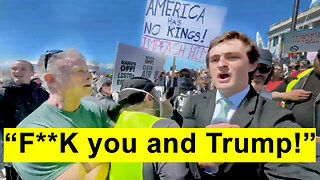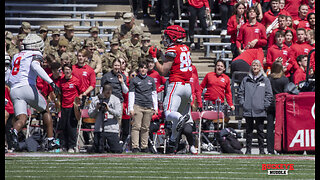Premium Only Content

The Teardrop Explodes - John Peel Session 1979
John Robert Parker Ravenscroft OBE (30 August 1939 – 25 October 2004), better known as John Peel, was an English radio presenter and journalist. He was the longest-serving of the original disc jockeys on BBC Radio 1, broadcasting regularly from 1967 until his death in 2004.
Peel was one of the first broadcasters to play psychedelic rock and progressive rock records on British radio. He is widely acknowledged for promoting artists of many genres, including pop, dub reggae, punk rock and post-punk, electronic music and dance music, indie rock, extreme metal and British hip hop. Fellow DJ Paul Gambaccini described Peel as "the most important single person in popular music from approximately 1967 through 1978. He broke more important artists than any individual."[1]
Peel's Radio 1 shows were notable for the regular "Peel Sessions", which usually consisted of four songs recorded by an artist in the BBC's studios, often providing the first major national coverage to bands that later achieved fame. The annual Festive Fifty countdown of his listeners' favourite records of the year was a notable part of his promotion of new music.
The Teardrop Explodes were an English post-punk/neo-psychedelic band formed in Liverpool in 1978. Best known for their Top Ten UK single "Reward", the group originated as a key band in the emerging Liverpool post-punk scene of the late 1970s. The group also launched the career of group frontman Julian Cope as well as that of keyboard player and co-manager David Balfe (later a record producer, A&R man and founder of Food Records). Other members included early Smiths producer Troy Tate.
Along with other contemporary Liverpudlian groups, The Teardrop Explodes played a role in returning psychedelic elements to mainstream British rock and pop, initially favouring a modernised version of lightly psychedelic late 1960s-influenced beat-group sound (sometimes described as "bubblegum trance"[2]) and later exploring more experimental areas. In addition to their musical reputation, the band (and Cope in particular) had a reputation for eccentric pronouncements and behaviour, sometimes verging on the self-destructive, resulting in the band's breakup in 1982
-
 LIVE
LIVE
Pepkilla
2 hours agoAI has taken over come with me if you want to live
255 watching -
 LIVE
LIVE
Grant Cardone
8 hours ago10X Business Summit Day 2
3,622 watching -
 1:51:26
1:51:26
SternAmerican
3 hours agoElection Integrity Town Hall - Lee County with Raj Doraisamy of Defend Florida 2:00pm Est
21.5K2 -
 12:01
12:01
T-SPLY
6 hours agoBREAKING - Jasmine Crockett Under Investigation For Fraudulent Campaign Donations
6.68K11 -
 39:07
39:07
Steph & Kayls
4 hours agoFrom Spicy Content to Sleepless Nights: The Chaos of Being First-Time Parents & Creators | Ep. 1
4.72K2 -
 1:36
1:36
Nick Shirley
6 hours ago $0.58 earnedThese Anti-Trump and Elon Protesters are Idiots
7.1K10 -
 17:08
17:08
World2Briggs
1 day ago $0.34 earned10 Worst Cities to Move if You Hate Yourself.
5.28K1 -
 13:32
13:32
megimu32
1 day agoKitKat vs. Twix: One Breaks, One Bites… Who Wins?
6.52K8 -
 24:04
24:04
Link to the Light
18 hours ago $0.11 earnedTop 10 Most Anticipated Games of 2025 - Link to the Light
4.5K2 -
 23:00
23:00
Ohio State Football and Recruiting at Buckeye Huddle
18 hours agoOhio State Football: Spring Game Recap | Biggest Concerns for Buckeyes?
3.12K